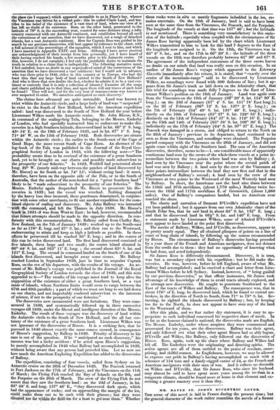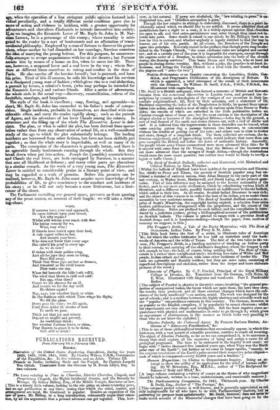MR. BAYLE ST. JOHN'S ECCENTRIC LOVER.
THE scene of this novel is laid in France during the present time ; but the general character of the work rather resembles the novels of a former age, when the operation of a less stringent public opinion fostered indi- vidual peculiarity, and a totally different social condition gave rise to more of actioa and violence in incident, with a greater opportunity for adventurers and chevaliers d'industrie to intrude themselves into society. gas we imagine, the Eccentric Lover of Mr. Bayle St. John is M. Nar- cisee Leroux, he is a personage of this stamp ; whose rascality is miti- gated to the reader by-a sort of bonhommie and an affectation of trans- cendental philosophy. Employed by a man of fortune to discover his grand- niece, whose mother he had dirmarded on her marriage, Narcisse conceives the idea of marrying the young heiress. For this putpose, he unsuecess- fiillyattempts to scrape acquaintance with her at the theatre ; but Fortune assists him by means of a house on fire, when he saves her life. There aae, however' a supposed lover and a real lover in the way; whom Nar- cisse at differentt times contrives to entrap and-confine in the dens of Paris. lie also carries off the heroine herself; but is pursued, and loses his, prize. Tired of this ill success, he sells his knowledge and his services to a dissipated young man of fashion ; which gives rise to a real abduction, a pursuit by lovers, a relative's lover, (who may perhaps be intended for the Eccentric Lover,) and various friends. After a series of adventures, the whole ends in the usual way—discovery, reconciliation, reform of the doubtfuli3, marriage, .and happiness.
The style of the book is excellent ; easy, flowing, and agreeable—in short, Mr. Bayle St. John has succeeded to his father's made of compo- sition. Single incidents, probable in themselves, are described with con- siderable effect, and carry the reader rapidly.along ; such as the pursuit of Agnes, and the adventure of her lover Claude among the coiner. In structure and the filling up of the whole The Eccentric Lover is defi- cient. The plan, or what is called the plot, has been derived from 'specie. lation rather than from any observation of actual life, or a well-considered study of the age to which the plot substantially belongs. The leading incidents are borrowed from other fictions, but have not been skilfully put together; so that the whole story is improbable, as well as many of its parts. The conception of the characters is generally better, and there is an agreeable family bonhommie running through the whole. But they break down when put into action. Joseph the (possible) eccentric lover, and Claude the real lover, are both entrapped by Naroisse, in a manner that sets all likelihood at defiance; and many other parts are obnoxious to a similar remark. As the work of a very young man, The Eccentric Lover is entitled to considerable praise in a literary point of view, and may be regarded as a work of promise. Before this promise can be realized, however, Mr. Bayle St. John must acquire more knowledge of the probabilities of life, to give consistency to the conduct and incidents of his story • or he will not only become a mere litterateur, but a litte- ratenr of the closet.
The Parliament curtailing our general space, prevents us from quoting any, of the prose scenes, on atieount of their length: we will take a drink- ingeelumt.
WINE.
If sorrows have your soul oppread, Or cares intrude upon your breast, Yet why repine Whist still within your reach doth flow The balmy remedy for wo, Wine, rosy wine !
If friends have turn'd upon their heel, A vain regret refuse to feel, And smooth your brow.
Who dcesnot 'know that every sage Has called his grief in every age As we do now ?
If riches with their golden wing,
And all thejoys they seem to bring, Have fled away,
Think that those joys are but as dreams, And transient as the vivid beams
That make our day.
Whea Sol beneath the hills hath rolfd, The wind that blows is chill and cold': Bat-say, what then? Count we Ins absence for an And mourn we for the day until He shines again?
Nay, nay; but whether black or white
Be the hWiers with which Time wings his flight,.
We fill the glass. Down goes the wine; we fill again, Until from midst th' abodes of men To earth we pass.
Think not that joy and misery
Depend on wealth and poverty,
As worldlings think; But whether Fortune frown or shine, . Pray Heaven to grant it to be thine, Still, still to drink !



























 Previous page
Previous page